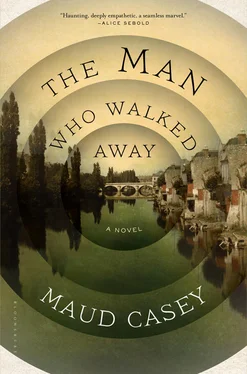“That is enough, Albert.”
The Doctor fiddles with the pin in his cravat. He cannot wait for tomorrow . He has been patient. They were moving in the right direction; piece by piece, they were recovering Albert’s life, and now this? Every day, he has been patient. He pulls the pin from his cravat and taps his wrist with it to calm himself. He imagines tapping the pin along the inside of Albert’s right arm. Tap, tap, tap along the bridge of his nose. He imagines plunging the pin through one of Albert’s ridiculous ears.
Each prick along the Doctor’s arm produces a pimple the size of a grain of millet.
“This is not your story, Albert, is it?”
Albert closes his eyes, mumbling something the Doctor can’t make out. “Careless.” Is that the word he whispers? The Doctor isn’t sure, but that’s what he thinks he hears. Each day, expecting answers to questions that have plagued this man his whole life. Why wouldn’t Albert try anything to please him? He is only trying to give the Doctor what he thinks the Doctor wants: the gift of an answer, any answer. He has been careless.
“What have I done?” Albert asks as the Doctor stands to go.
“I will be right back,” he says, leaving Albert there. And he planned to be right back. He did. He planned to go outside only for a moment. He planned to take some air to relieve his shame. He planned to ride his bicycle once around the loop of the lake and then return refreshed. But then there is the Director in the common room, a small rake in one hand, squatting next to Elizabeth, who is in tears over her puzzle.
“My dear, my dear,” he is saying, “a funicular is a complex piece of technology.”
“But,” she says, “what if they walk up the hill before I am done?”
“There is no rush,” he says, stroking her back. “No rush at all.”
“How could you know?” she wails. “You are not inside their minds. How could you know?”
He has caused this too. The Doctor planned to return, but then: What do you know? What do you know? It seems he knows nothing, nothing at all.
The answer lurks in unlikely places. It is not to be found, for example, on the well-pedaled loop around the lake. It doesn’t matter. The Doctor mounts his bicycle and pedals to the lake path, not marveling at the connection between his own skeleton and the metal of this wondrous machine— the communion of man and metal , as his beloved book on bicycle riding calls it — not finding the system in the pleasure or the pleasure in the system. He will take that trip to Paris after all. He will leave tomorrow. Perhaps the great doctor has something to offer; perhaps the Doctor will learn something.
Click-clickety-click. The Doctor completes another pass around the lake. I fear I will walk very far away, with no one to watch over me . Wrapped inside this sentence like a poorly kept secret is another question: Will you help me? More often than not, we rely on what has worked before. What to do until we see beyond the familiar? Until our eyes become new? I am in pieces . The Doctor pedals faster to feel the wind, to feel anything other than the fear that the vague something of Albert will never take shape. This was certainly not what Michaux felt before he invented the clever pedal.
The geese float in the center of the lake, their heads tucked beneath their wings, while on shore the ducks waddle and squawk. Click-clickety-click. This wonderful, gravity-defying machine, so carefully constructed, so solid, so there , is nothing like the mysterious gray matter tucked inside the shell of the skull. It is nothing at all like the nebulous mind; nothing at all like the nebulous mind gone awry. Click-clickety-click. He pedals until he is no longer aware of pedaling, until he becomes the pedaling, until he is movement itself; the wind tickles the hairs in the coil of his ears. He rides too close to the fir tree to test his balance, and though the bicycle trembles, he will not fall again. He will not. The tree sprays his face with dew.
Honk! A goose floating in the middle of the lake suddenly lifts its head from its wing. Honk, making fun of the Doctor. Honk: You are ridiculous. Honk: so young, so serious, so full of big honking thoughts.
But the goose isn’t concerned with the Doctor’s big honking thoughts, not at all. A little boy and his mother have wandered into the park. The boy’s delight has startled the geese awake and now they honk and float in anxious circles. He points and waves, points and waves. He is waving at the Doctor. It is still exciting to see a bicycle. To spot one is to see time and space forever transformed. Cycling telegraphists bringing news from the cities to the countryside and back again; infantrymen on wheels; and on certain saint days, it is rumored that a parson in a village dresses up as the patron saint of the local parish and rides his bicycle from house to house to house, taking confessions. The bicycle is a vehicle of forgiveness in addition to being a cure for gout, rheumatism, hernia, curvature of the spine, anemia, tuberculosis! Sterility too, though as the Doctor hits another bump in the path he thinks maybe not. A stimulator of appetite, an expander of the thoracic cage, a creator of better posture, improved fibrous tissues!
He pedals faster and the boy jumps up and down, pointing and laughing on the opposite side of the lake as his mother brushes the hair from his eyes. He pedals past his bones, past his muscles, until he and the machine are one and his ambulatory powers are multiplied, until he is half steel, half flesh. One moment the pebble-shaped end of his fibula is awhirl, and the next his heart is being tugged like a balloon. He is so close to grasping the something of Albert; he would give anything to grasp it. Take his vertebrae. Take his clavicle. Take his lacrimal bone. Lacrimal, lacrimal, lacrimal!
He rushes ahead, through space and time to the moment when he will give Albert an answer to his question: This is who you are. The wind on his face slices through the feeling of almost and then his bicycle lifts off; it flies above the lake, over the city. It flies until there are his mother and father. They are alive again and he is their jumping-up-and-down boy. When they take him up in their arms, the answer is: You are forgiven. When he puts his face in the warm crook of their necks, they are healed.
A great swoosh, an enormous flutter and splash, and the geese rise up: over the park, over the cathedral, up and up and up. The Doctor yearns to go with them, to show the jumping-up-and-down boy just how magic this new machine is. He feels the possibility of flight in the beautiful coral of his bones.
But the jumping-up-and-down boy has lost interest in the Doctor and his magical machine. He pulls at his mother’s skirts, pointing at the sky, his finger tracing the path of the geese as they fly away.
It was meant as an offering. He only wanted to smooth the lines on the Doctor’s face. Yesterday as he was waiting for him to arrive, he studied the map, trying to remember what came between here and here , and here and here , but he could not. When he heard the veteran saying, “Deserter, deserter,” desperation shone its anxious light on the story of the man who was mistaken for the czar. It was a story his father told him, one of the many of the prince who wanted to see the world. This story with a beginning, a middle, and an end seemed like the solution to the problem of the cracked pieces of Albert’s own life with their cutting edges.
But then, I will be right back , and like everything else in Albert’s life, the Doctor disappeared.
Prick. Prick. Prick.
Читать дальше












